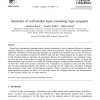4126 search results - page 77 / 826 » Set based logic programming |
127
click to vote
NMR
2004
Springer
15 years 7 months ago
2004
Springer
All major semantics of normal logic programs and normal logic programs with aggregates can be described as fixpoints of the one-step provability operator or of operators that can...
108
Voted
LPNMR
2009
Springer
15 years 9 months ago
2009
Springer
We consider random logic programs with two-literal rules and study their properties. In particular, we obtain results on the probability that random “sparse” and “dense” pr...
130
Voted
JCP
2006
15 years 2 months ago
2006
Finding a maximum cardinality matching in a graph is a problem appearing in numerous settings. The problem asks for a set of edges of maximum cardinality, such that no two edges of...
121
click to vote
CL
2000
Springer
15 years 2 months ago
2000
Springer
Recent logic programming languages employ dynamic scheduling of calls to improve e ciency of programs. Dynamic scheduling is realized by allowing some calls to be dynamically &quo...
109
click to vote
FSS
2007
15 years 2 months ago
2007
We investigate the use of multilattices as the set of truth-values underlying a general fuzzy logic programming framework. On the one hand, some theoretical results about ideals o...

